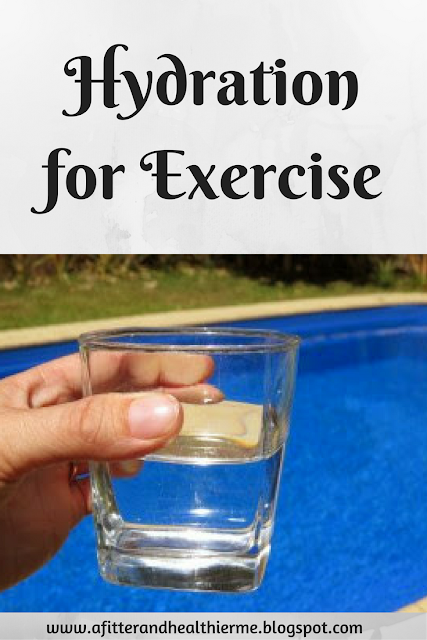After realising that hydration doesn't just mean 'drinking lots of water', I decided I should learn about how to hydrate myself properly for exercise ! Here's what I've learnt in basic terms.
If you're exercising moderately for 45 mins to 1 hour, then your body should have enough carbohydrate stores for energy. So for this amount of exercise, just eating well and drinking water should be fine.
Over the past year, I've increased the amount of exercise I do and the intensity - and now I do a hour's hard workout most days with longer ones at intervals, so I really need to be looking at ways to hydrate and replenish my body other than just plain water.
Before exercising
You need to hydrate your body well before a long hard workout, race or game, (whatever your choice of exercise is). Your body should have the full balance of electrolytes (sodium and potassium seem to be the main ones needed), and plenty of carbohydrates for your body to use as energy. That's why you hear about 'carb loading' before a long distance race.
Chia Seeds
Chia Seeds have been used in Central America - particularly Mexico, by the locals for thousands of years - mixed with water to sustain them on long journeys from settlement to settlement. The Tarahumara people of north Mexico are renowned for their long distance running abilities. They are said to drink a chia seed drink before they run to give them stamina and hydration.
Chia seeds absorb about 10 times their own weight in water. So if you soak them for around 15 mins, they form a kind of gel. When ingested, your body only slowly breaks the gel down to release water into your system, making chia 'gel' excellent for keeping your body hydrated over long periods of exercise!
I really like the sound of this - chia seeds apparently have no particular taste, and you can add them to pretty much anything. Chia seeds also have plenty of other great nutrients including protein, fibre and omega 3! All round great. I'm definitely going to be trying these.
Isotonic Sports Drinks
These drinks are formulated to have a similar content of sugar and salt to that which we have in our bodies. This means that when we drink sports drinks, the water is absorbed quickly into our bloodstream . ( We also gain the energy from the sugar and replace the salt that we have sweated out.)
Sports drinks can be helpful before, during and after a major workout to maintain your body's balance of fluids and electrolytes while also keeping up your energy levels.
During exercise
It's not really easy or feasible to eat during a major workout, race or game, so the body needs something to nourish it that is quick and easy to ingest. As mentioned above, sports drinks can help this by providing more than just water to rehydrate. You can also buy special power gels for this purpose- although the ones I have tried I really haven't enjoyed the taste.
Taste is important for proper and sufficient exercise hydration. If a drink or gel tastes pleasant you're much more likely to drink enough of it to get what your body needs out of it.
I've also read that sipping a sports drink every 10 - 15 mins during your workout helps keep your body hydrated and balanced, so I try to do that now and have to say that I've noticed a difference in my more constant energy levels - rather than pushing hard for a longer period, then taking a break for water or a sports drink.
After exercise
Again once you've finished, you need to replenish what your body has used up during your strenuous workout. Sports drinks as mentioned above help do this quickly. Another thing I've found that is supposed to be really good for rehydrating your body and replacing lost minerals, is celery juice! Celery has plenty of soluble sodium, which is perfect for replacing that which your body has lost by sweating. Celery is also a very watery vegetable, so provides hydration too! Mind you the idea of munching on a celery stick after a big workout isn't so appealing, but I have started to have freshly juiced apple, orange, celery and kale juice, which actually tastes really good, and is packed full of natural sugars and sodium to replenish your body.
On the subject of celery....apparently in the ancient Olympic games, one of the prizes awarded to winners was a crown made from wild celery! So not only is it nutritious - but it's an Olympic vegetable!
So after learning all of this, what does it mean I'm going to do?
- Consciously keep my body hydrated at all times, plenty of water, but also electrolytes too, I'm enjoying my fresh juice with celery in, I'm also going to start adding chia seeds here and there in my diet, particularly before a major workout or race.
- Sip water regularly during my shorter workouts - but once they start to go over an hour, I'll add in sports drinks, or maybe one of my freshly squeezed juices in a bottle.
- In the few days leading up to a big race (I don't do that many, only a handful in a year), I'll increase my salt intake, and hydration with not only water, but fresh juices, chia gel and maybe sports drinks too.
At least I feel much more aware of what my body needs now, and how to prepare for harder and longer workouts as I become fitter and push my body more and more!



No comments:
Post a Comment